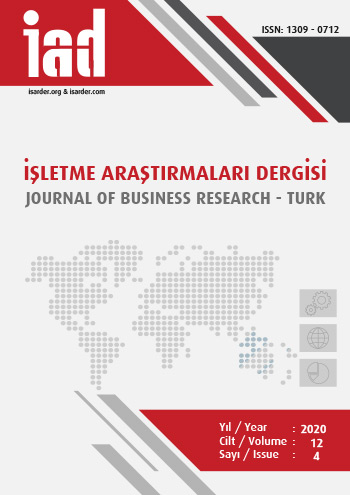Psikolojik Sahiplenme Ölçeğinin Türkçe Uyarlaması, Güvenilirlik ve Geçerlilik Çalışmaları
Turkish Adaptation, Reliability and Validity Studies of Psychological Ownership Scale
Author(s): Mustafa Aslan, Hülya AteşoğluSubject(s): Business Economy / Management, Social psychology and group interaction, Marketing / Advertising, Business Ethics
Published by: İşletme Araştırmaları Dergisi
Keywords: Psychological Ownership; Affectional Psychological Ownership; Job-Based Psychological Ownership; Organizational Citizenship Behavior;
Summary/Abstract: Purpose – The purpose of this study is to acquire a scale for Turkish literature to be used in psychological ownership studies. The scale that is going to measure not only because of affection but also the obligation of tasks performed or representative positions. Design/methodology/approach – The psychological ownership scale developed by Shukla and Singh (2015) was translated into Turkish by using the method suggested by Tsang et al. (2017), and a pilot study with the final form of the scale was conducted with 36 participants. The validity and reliability of the Turkish version of the scale were analyzed with participants from two different groups by using the convenience sampling method. The questionnaire forms were delivered to the participants in electronic form, and validity, reliability, exploratory and confirmatory factor analyses performed on the data obtained by using the statistical package program, and the results were reported. Findings – While the original scale that was developed in the Indian context has three dimensions that are affection, connectedness, and obligation, the Turkish context of the scale was determined to create only a two-dimensional structure. These dimensions were named Emotional Ownership and Job-Based (Obligation) Ownership by taking into account the literature and expressions that make up the dimensions. It was determined that the variance explained by the scale was 69%, the reliability of the Emotional Ownership dimension (Cronbach α) was 0,905, and the Job-Based Ownership dimension was 0,853. Discussion – In this study, that was conducted to acquire a scale for Turkish literature to be used in studies that use psychological ownership, which is one of the most frequently studied variables in Turkey in recent years, a scale that has developed in the Indian context, translated and adapted to Turkish context, and validity and reliability analyses have been performed. The dimensions obtained from the Turkish context of the scale seem to coincide with the findings of social-psychologist Lita Furby'n (1991). Furby stated that although there are many different dimensions of ownership, all these dimensions have two main reasons: personal competence or control (the job-based ownership dimension of the scale) and the relationship between the self and the object (the emotional ownership dimension of the scale).
Journal: İşletme Araştırmaları Dergisi
- Issue Year: 12/2020
- Issue No: 4
- Page Range: 4184-4195
- Page Count: 13
- Language: Turkish

